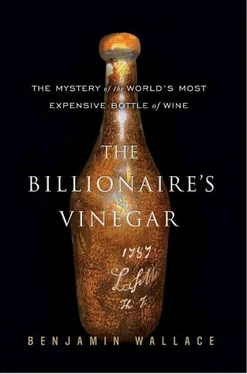Now sixty-five, Koch wanted to ensure that there would be no repeat of his decadrachm experience. The MFA had asked him to supply provenances for every object in the show, but with only weeks to go before it opened, the prospects for guaranteeing the authenticity of the Jefferson bottles were dim. In March, Brad Goldstein, his spokesman, had had an initial phone conversation with Susan Stein, the curator at Monticello, that got his antennae up. When Goldstein told Koch of Monticello’s doubts, Koch “was not a happy camper.”
Koch could have been forgiven, at this point, for choosing to leave well enough alone. It must have been tempting simply not to know, to continue to believe he possessed a treasure that might have belonged to Thomas Jefferson. He risked embarrassment if it were revealed that the bottles he had paid so much for and taken such pride in were not what they seemed. He must have known that this was strictly a rich man’s problem, though, as likely to arouse schadenfreude as sympathy.
He also was painfully aware that he made a soft, fat target for the press. When he had subpoenaed his eighty-two-year-old mother, all the jackals could focus on was the stroke she’d had a few months earlier, totally disregarding that she sided with his brothers in the fraternal feud. Yes, he’d wanted to compel her testimony, but after all, he hadn’t known about the stroke at the time; once he found out about it, he abandoned his effort. When he had expelled his mistress from a $2.5-million condo he owned at the Boston Four Seasons, the media harped on how she was a single mother and the eviction had taken place on Christmas Eve so that he could throw a party in the 3,700-square-foot spread, never mind that he could have evicted her thirty days earlier. When he was arrested for domestic violence after his second wife accused him of punching her in the stomach and “[threatening] to beat his whole family to death with his belt,” the hacks were all over it, neglecting to point out that witnesses to the altercation had disputed his wife’s account and that she later recanted it. (The charges were ultimately dismissed.) Although a court issued a restraining order against Koch, his Palm Beach estate was spacious enough that he was able to stay in a beach house on the property and still be in compliance.
Koch’s darker side was mitigated by a disarming willingness to introspect in public—about his years in psychoanalysis, say (“For a long time I didn’t think I was worth shit”), or his short fuse (“I could be a really nasty prick…. [In later years] I would go up to my secretary [and say], ‘You dumb shit, why’d you make that mistake?’ I was that kind of guy”). But the candor didn’t always help his case. A 1994 Vanity Fair profile, written with Koch’s masochistic cooperation, had been a mutilation without anesthetic, likening his paranoia to Richard Nixon’s and his dissembling to Bill Clinton’s and saying Koch is “a man whose closet is free of skeletons in large part because they all seem to be turning somersaults in his living room.”
Worst of all was the Boston press, which delighted in quoting from naughty love letters between Koch and his “X-rated Protestant princess,” as the evicted mistress styled herself. (“My body parts are like moist orchids in bloom,” she wrote in one fax. Koch, somewhat less steamily, described his ardor as “beyond calculation by the largest computers.”) Boston reporters almost uniformly deemed the MFA show crass and egotistical. Boston Globe columnist Alex Beam was especially caustic, gratuitously noting that Koch “rhymes with joke” and disinterring the moldy beat-his-family-to-death-with-a-belt threat allegation. With Koch talking about a lawsuit, the Globe subsequently ran a fairly groveling editor’s note acknowledging the conflicting evidence. But who reads editor’s notes? Koch felt he could not get a fair shake.
On the other hand, Koch couldn’t stomach feeling taken advantage of. In 1985, after deciding that his brothers had cheated him in their settlement, Koch had gone back to court. What followed, Bill Koch said later, “would make Dallas and Dynasty look like a playpen.” There were private detectives and wiretaps and room bugs and body mikes and stolen garbage bags and scurrilous whispering campaigns. There was even a mysterious Israeli “security consultant” whom Koch’s own employees later accused of taping their calls on Koch’s behest (a charge Koch denies). Many more lawsuits followed. Fortune called it “perhaps the nastiest family feud in American business history.”
The same mix of traits that had mired Koch in ruinous litigation and led him to victory in the America’s Cup—contrarian determination, a belief in technology and professional investigators, scads of money, a profound need to win, and an impish glee at sticking it to the man (or, it sometimes seemed, the straw man)—would prove equally useful when it came to the Jefferson bottles. In the end, Koch decided to get to the bottom of the matter, and the person he charged with investigating it was a former FBI agent named Jim Elroy.
Elroy had crossed paths with Koch in the 1980s, when Koch, in the midst of the eye-gouging brawl with brothers Charles and David, blew the whistle on their alleged theft of oil from Indian reservations. Elroy served as an investigator for the Senate Select Committee on Indian Affairs, which looked into the accusations and found them to have merit, and Koch was impressed by his work. Elroy, who went by the e-mail sobriquet SEAWOLF410, also happened to share Koch’s interest in sailing.
Now one of Elroy’s men went to Charlottesville, Virginia, and spent several days at Monticello doing his own research into the bottles’ Jefferson connection. Among the people he met was Cinder Goodwin Stanton, who was now the Shannon Senior Research Historian. Twenty years before, she had found the entire matter unpleasant. Her attitude had since mellowed into bemusement. She had no new theories about the bottles, and hadn’t read her own report on them in two decades. When she reexamined it now, she was embarrassed to see that she had written that Hardy Rodenstock was a man “of unquestioned knowledge and integrity.” Her Jefferson research had since led her in other arcane directions; just now she was working on an article about Jefferson’s moldboard plow. As Koch’s investigator retraced the steps taken by Stanton in 1985, he found the same gaps and omissions in the Jeffersonian record as she had. Which is to say almost none. “Jefferson was anal, ” Elroy recalled.
As Bill Koch’s team expanded their inquiry, they noticed that a lot of people were nervous. Monticello refused to give Goldstein a copy of Stanton’s 1985 report. When a deputy of Elroy’s contacted Farr Vintners, he was referred to the firm’s solicitors. After Elroy spoke with Count Alexandre de Lur Saluces and learned about the Frericks controversy, he began to wonder whether the Jefferson bottles were even real. Lur Saluces told Elroy that, as far as he knew, the document Rodenstock claimed was a page from Yquem’s ledger—showing an order by Jefferson of the 1787 vintage—hadn’t come from Yquem’s archives.
Elroy was drifting straight toward the same morass of subjectivity that had bedeviled all previous challenges to the bottles—the arguments about bottle variation, the blind street of Rodenstock’s reticence, the how-would-you-know-what-it’s-supposed-to-taste-like posture, Monticello’s skepticism versus the impossibility of proving a negative, the inadequacy of existing radio-dating methods, the sensory validations by such luminaries as Broadbent and Jancis Robinson, not to mention the disincentive for Koch to sacrifice a bottle that had cost tens of thousands of dollars for a test that might not be definitive. The odds were against his coming to any more certain a conclusion than had the few people before him who had questioned their bottles.
Читать дальше












